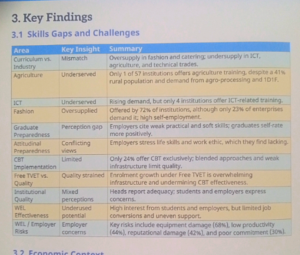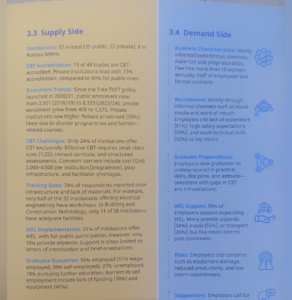
A recent 2024 Skills Supply and Demand research conducted in all 43 districts of the Ashanti Region has revealed significant defects in the Technical and Vocational Education and Training (TVET) curriculum.
The study, moderated by trained Industrial Liaison Officers and Supervisors steered by Unicef Ghana found a glaring mismatch between the skills being taught and the needs of the job market.

The research highlighted an oversupply of graduates in fashion and catering, while there was a notable lack of focus on Information Technology and Agriculture. This imbalance creates employment challenges and compromises the quality of TVET.
With an 89 percent response rate sampled from 580 stakeholders, the findings showed that only one out of the 57 TVET institutions offers agriculture training, despite a 41 percent rural population and demand from agro-processing and 1D1F. Moreover, the research found that many employees are unenthused about the practical skills and work ethic of graduates.
Speaking in an interview at a colorful ceremony held 28th August at Lancaster Hotel to present the research findings in Kumasi Dr. Tillmann Guenther, Education Specialist at UNICEF Ghana, reiterated the situation demands an urgent structural overhaul of TVET.

He emphasized the need for the government to focus on providing Competency-Based Training (CBT) and addressing the infrastructural demands of the sector.
CBT, according to him would equip students with the skills and knowledge required by industry, making them more employable.

The Ashanti Regional Director for TVET, Engineer Richard Addo Gyamfi, acknowledged the mismatch between demand and supply of skills. To address this, his outfit has begun engaging industry players to better understand their skill requirements.

This will enable TVET to streamline its courses along relevant career paths. Additionally, students will be engaged in industrial apprenticeships to make them more relevant in the job market.
Engineer Addo Gyamfi advocated for the inclusion of Digital Technology training in all TVET programs. This would equip students with the skills needed to thrive in a rapidly changing job market. He expressed hope that the government would support this initiative.

The research findings and subsequent proposals highlight the need for a more responsive and effective TVET system.

By overhauling the curriculum and incorporating industry-relevant skills, TVET can better prepare students for the job market. This would have a positive impact on the economy and society as a whole.
To improve TVET, the stakeholder recommend a competency-Based Training to Focus on providing CBT to equip students with industry-relevant skills, Industry Engagement, Digital Technology Training and Industrial Apprenticeships

Provide students with industrial apprenticeships to make them more relevant in the job market.
By implementing these recommendations, TVET can better prepare students for the job market and contribute to the country’s economic development.
By Sterley Asumadu





